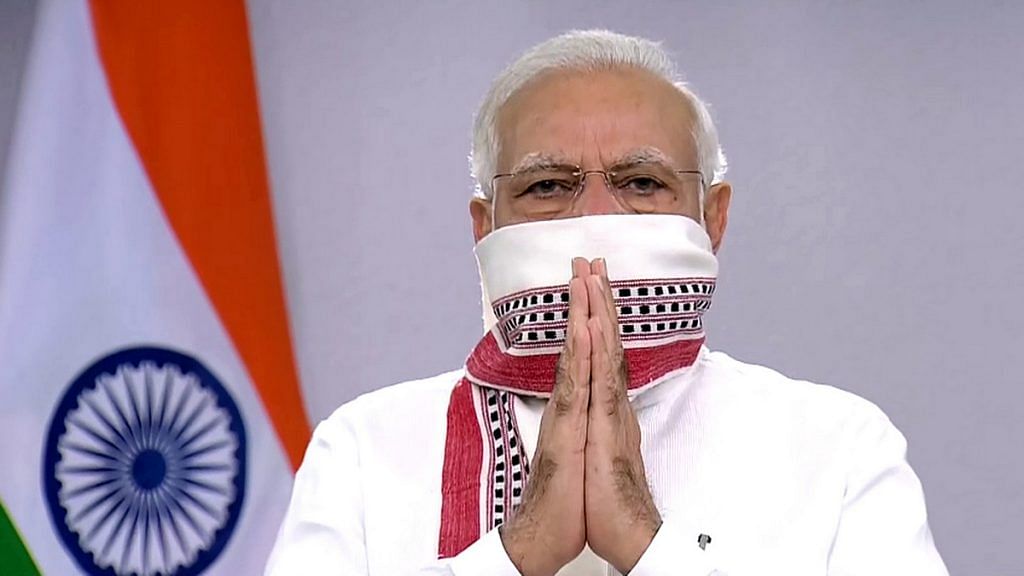All politicians are riding a tiger right now during the coronavirus pandemic lockdown – from US President Donald Trump to Prime Minister Narendra Modi.
Having won accolades for the bold, timely decision of imposing a nationwide lockdown on 24 March to fight the coronavirus crisis, Modi knows that both the extension and the easing of the lockdown now will only bring diminishing political returns. The first lockdown announcement in March, through the address to the nation, was the poetry of politics. In May, however, both its extension and lifting are ensnared in prose — in the fine print of government notifications, orders and guidelines. As many as 3,940 of them, from both the Centre and the states, at last count.
So, the decision now is to let the states figure out when and where to lift the lockdown in a phased manner. You can either look at it as evidence of Modi’s belief in India’s federal system or his unquestionable political instincts.
Now, a smart politician like Modi wouldn’t want to lose the initial surge in ratings during the greatest health and economic crisis. What’s more prudent for him is to know when to leave the podium, or get off the tiger.
If PM Modi is seen to preside over a national lockdown too long, he knows that credit will slowly get diluted with inconvenient questions about implementation, testing, hospital beds, curve flattening, economic damage, hunger and unemployment.
Also read: Situation normal, but all locked up: How Modi govt has risked incapacitating India
Modi knows political costs
The Centre “lets states reorder zones”, said The Indian Express front page Saturday. It is now up to the states to draw a roadmap of a phased lifting of restrictions – by sector and coloured zones.
This is not to say that these are purely political decisions. But these decisions have health and economic fallout, so they have political costs too. And a 24×7 consummate politician like Modi wouldn’t be unaware of this.
Modi is still ruling the popularity surveys, something that home minister Amit Shah flaunted in the middle of a pandemic in a tweet. It was, of course, less cringey than US President Donald Trump tweeting his own approval ratings. Either way, as Asim Ali and Ankita Barthwal wrote in ThePrint, the BJP hasn’t suspended its politics during the biggest public health emergency in the past century. Undoubtedly, political considerations will underline how these decisions are taken and executed.
Also read: Covid lockdown has ended only opposition politics in India. BJP’s shop is very much open
The Boris-Bolsonaro-Trump club
In the United States, Donald Trump is weighing these political risks too. Only he is less cautious than Modi. Showing growing impatience to re-open America, Trump even warned: “If some states refuse to open, I would like to see that person run for election.”
This was the most public admission of a definite political cost of the lockdown. But lifting a lockdown in a hurry isn’t less risky either. Calibrating the unlocking is crucial. If you get the timing and sequence wrong, then bad politics awaits you.
A public poll in France in the last week of April showed that support for strict lockdown had dropped below 50 per cent for the first time.
Most Americans support continuing the lockdown, and are largely opposed to those who protest it. In recent days, some ‘internet subcultures’ consisting of gun-advocates and anti-vaxxers are starting to oppose the lockdown on the grounds of freedom, the favourite American template. In California, mayors are even clashing publicly with governors on whether to lift the lockdown or not.
The popularity ratings of Brazil’s Jair Bolsonaro, Britain’s Boris Johnson and Italy’s Giuseppe Conte have also soared during the pandemic.
Re-distributing risks
If Modi cedes the decisions for the remaining lockdown period and tweaking of restrictions to state chief ministers, he would come out like a national leader who acted early enough, showed the way and then left it to others to carry on, in true federal spirit.
After the initial lockdown speech, Modi has been appearing more federal and consultative in his subsequent announcements.
This could be part of his exit strategy, to spread out the risks. Of course, Modi’s supporters will say that his critics have a problem both when he centralises decisions and when he leaves it to the states. But the point here is the timing. The decision to re-open India is fraught with political risks, and hence that gets shared.
Also read: Coronavirus has brought India’s almighty Centre back, and Modi’s unlikely to give up control
Win-win move?
Can the chief ministers afford to lift all restrictions or will they be extra-cautious? The impatience with which they (Arvind Kejriwal, Uddhav Thackeray, K. Chandrasekhar Rao) want to push out migrant workers from their borders and are digging trenches to prevent movement (Manohar Lal Khattar) indicate they will err on the side of caution and won’t lift lockdown in any tearing hurry. Especially since returning migrants are testing positive and green zones are decreasing in many states.
“The number of Covid-19 hotspot districts in India has come down to 129 from 170 a fortnight ago, but in the same period, the number of infection-free districts or green zones too decreased from 325 to 307,” said India Today on 30 April.
Tamil Nadu has only one coronavirus-free green zone.
As the Modi-led central government issues some guidelines for easing the lockdown, the fine print is in the coloured zones in the states and in the cautious decisions that chief ministers will have to take. But states may find their hands tied.
Punjab chief minister Captain Amarinder Singh told India Today Saturday that states should be empowered to draw up their own coloured zones, and not a bureaucrat in the Union health ministry.
If it works Modi can claim credit, if not, shift the blame to the states and the chief ministers.
Views are personal.
